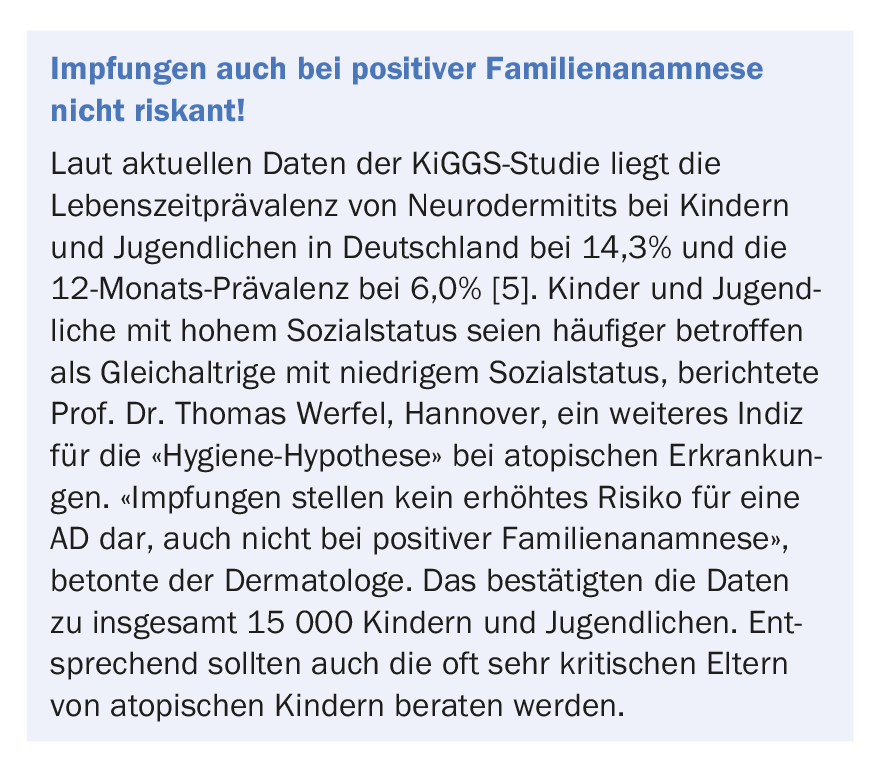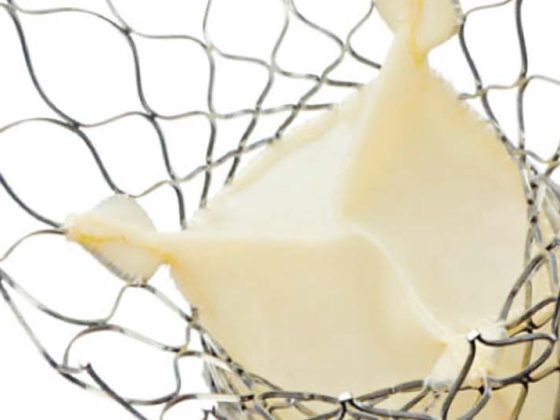Atopic dermatitis (AD) is considered complex, is allergen-mediated in most patients, and is associated with many comorbidities. Increasing knowledge of key inflammatory mediators has paved the way for new biologics that promise therapeutic breakthroughs.
“Interleukin (IL)-4 and -13 are the key cytokines in AD,” said Professor Thomas Werfel, MD, dermatologist at Hannover Medical School, at Allergo Update 2018 in Cologne, Germany. Recently, Dupilumab, the first biologic for adult AD patients that blocks the function of these two Th2 cytokines, has been approved in Germany – a very efficient therapeutic principle in many patients. “The trial data on dupilumab are sensational,” Werfel said, describing the research status. The subcutaneously administered antibody, which targets the anti-IL-4 receptor alpha chain, is a “game changer” in AD therapy, he said. In a recent study, dupilumab achieved an EASI-75 response after 16 weeks in approximately two-thirds of those treated (vs. 23% placebo) [1]. In 39% of those treated, (almost) complete healing of the skin disease was achieved.
However, many other mediators play a role in the pathogenesis of AD that are candidates for targeted therapy. In severely affected AD patients, mutations were found in the CARD11 gene, which is involved in the regulation of signal transduction of T-cell receptors, the dermatologist reported. Attempts are currently being made to at least partially reverse CARD11 defects by supplementing the amino acid glutamine. Clinical studies on this approach are planned, he said. It is also possible that the peptide RNAse 7, which is antimicrobial and immunologically active, has a special function in atopic dermatitis. A subgroup of AD patients has no Th2 autoimmunity, according to Werfel. However, new drugs targeting the acute-phase response, such as the anti-IL-6 receptor blocker tocilizumab, are also about to be approved for these patients, he said. However, biologics are indicated for atopic dermatitis AD only at levels 3 (moderate, intermittently severe eczema) and 4 (persistent, severe eczema).
“Something has to change in the treatment of severe AD,” Werfel said. In addition to dupilumab, ciclosporin, an old systemic therapy, is currently approved and should only be used after an individual benefit-risk assessment. Werfel judged the clinical efficacy of ciclosporin to be inconclusive, with a maximum EASI-50 response rate of 50% and an EASI-75 response rate of 34% after 12 weeks of therapy.
System therapeutics without an approved indication (off-label) are methotrexate, azathioprine and mycophenolate mofetil. The latter was teratogenic and mutagenic. The current S2k guideline on the management of atopic dermatitis from 2016 [2] is already outdated again and needs to be expanded to include new system therapeutics, Werfel said. There is no indication for the long-term use (>3 weeks) of systemic glucocorticoids – “unfortunately still widespread in severe eczema” – in AD. They should only be used for a short time in the thrust. If UV therapy is used (not recommended in children), it should be considered that it cannot be combined with ciclosporin or azathioprine.
In 80% of AD patients, there is an atopic background and elevated serum IgE levels can be detected. Environmental factors and allergens often contribute to sensitization of patients. Most important are aeroallergens such as house dust and pollen allergens and, in children, food allergens such as milk, egg white, soy and peanuts. Also, in AD patients with elevated serum IgE levels, the anti-IgE omalizumab has no therapeutic effect according to the data to date.
“90% of all skin lesions in AD patients are colonized with staphylococci,” Werfel reported. “The more severe the atopic dermatitis, the greater the proportion of staphylococci on the skin.” Unlike on healthy skin, coagulase-negative staphylococci with antimicrobial activity are rare on the skin of AD patients. In milder disease, S. epidermis dominates; in severe AD, S. aureus can often be detected as well. House dust mites are also frequently colonized with staphylococci and E.coli and could contribute quite substantially to IgE sensitization via microbial antigens, Werfel said. Severe AD had already been associated with IgE against microbial antigens, and not against mite antigens.

Topical antiseptic therapies are well established in AD patients. Werfel favors octenidine solution or gel. Chlorhexidine can induce severe contact allergies in rare cases; triclosan, an equally effective antiseptic, is associated with more side effects and has therefore been banned in cosmetics in the EU. Antiseptics should be used as selectively as possible, according to Werfel. “As long-term therapy, the use of broad-spectrum antiseptics in AD is not recommended,” he said. Systemic antibiotics should be used only if there are clinical signs of bacterial superinfection of AD.
A new method based on laboratory parameters is available to determine the severity of AD. The EASI p-EASI, meaning predicted skin score EASI, is a combined score calculated from serum levels of the chemokine CCL17, sIL2R, and IL-22 [3]. According to Werfel, the value calculated with an elaborate formula correlates excellently with the skin score EASI.
Help away from topicals and systemic therapeutics
Neurodermatitis training shows good effects not only in children and adolescents, but also in adults. In a recent German multicenter study with a total of more than 300 participants, the benefit of interdisciplinary training (6×2 hours in an outpatient design) was impressively demonstrated for almost all parameters investigated, e.g., in the management of pruritus or quality of life, over the course of one year [4]. In contrast, there is no evidence for the benefit of a low-vitamin diet. Werfel: “No particular diet is favored.”
Literature:
- Blauveldt A, et al: Long-term management of moderate-to-severe atopic dermatitis with dupilumab and concomitant topical corticosteroids (LIBERTY AD CHRONOS): a 1-year, randomised, double-blinded, placebo-controlled, phase 3 trial. Lancet 2017; 389: 2287-2303.
- Werfel T, Heratizadeh A, et al: S2k-Leitlinie Neurodermitis (atopic eczema, atopic dermatitis)-Kurzversion.
- Allergo Journal 2016; 25(3): 36-51.
- Thijs JL, et al: EASI p-EASI: Utilizing a combination of serum biomarkers offers an objective measurement tool for disease severity in atopic dermatitis patients. J Allergy Clin Immunol 2017; 140(6): 1703-1705.
- Heratizadeh A, et al: Effects of structured patient education in adults with atopic dermatitis: Multicenter randomized controlled trial. J Allergy Clin Immunol 2017; 140: 845-853.
- Schlaud M et al: Vaccinations in the first year of life and risk of atopic disease – Results from the KiGGS study.Vaccine 2017; 35: 5156-5162.
DERMATOLOGIE PRAXIS 2018; 28(2): 39-40











